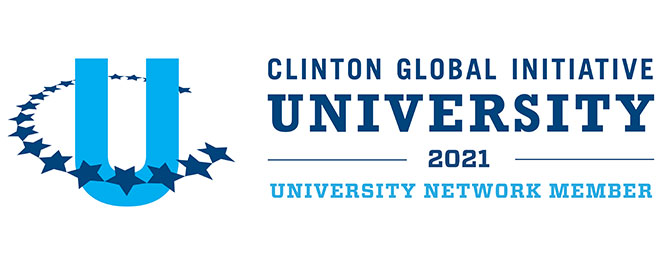Patrick Kalonde spent his first year of graduate school working on a problem that affects communities across the world, including in his home of Malawi — waste management.
In many countries there is no system of garbage collection and household waste is disposed of into the street, he said.
His project through the Clinton Global Initiative University is targeting a community in Malawi to develop a community waste recycling center by building a local team in the community to work on the center.

Kalonde is a Fulbright scholar, graduate student in Geography specializing in Geographical Information Science and is working as a Clinton Global Initiative University coordinator at St. Cloud State. The Clinton Global Initiative University is a leadership program that connects students with leadership opportunities by helping them develop a proposal to tackle an issue locally, nationally or globally that will change the world.
The Clinton Global Initiative University helped him to develop his project by connecting him with experts to better understand the problems faced by the communities in setting up waste management systems as well as develop partnerships with people working around the world to tackle the same problem.
He was one of three St. Cloud State students to participate in the program from St. Cloud State last year.
Abdigani Ahmed worked on a project to support marginalized and low income populations in St. Cloud. He worked with CommunityWise Services Inc, a non-profit organization designed to help marginalized and low income people in St. Cloud gain access to critical healthcare, education, mental health and social services. CommunityWise Services is in the process of building a website and a board of directors. The organization targets assistance to people of color, second language speakers, refugees, low income individuals and families and other at-risk populations.
Tiana Aprianti, a graduate student in Educational Administration and Leadership, worked on a project to increase elementary student access to books in the Indonesia.
The project, Books Mobile, will work with several schools in the Kubu Raya community, West Kalimantan, Indonesia, where the books will be lent to the schools in a timely manner. With this system, the program can cover several schools and students, Aprianti said.
Many schools in Indonesia have limited access to books. About 30 percent of elementary schools in Indonesia don’t have any library and many others have only a small library with limited quality and quantity books, she said.
“The purpose of this project is to increase reading habits in Indonesia,” she said. “I believe reading will help students to develop better critical thinking, increase the vocabulary and comprehension and furthermore, give the knowledge on how to see things differently from the perspective of the author.”
Recruiting the next applicants to CGIU
Kalonde is serving as the Clinton Global Initiative University coordinator at St. Cloud State and he is working with China Program graduate assistant Matthew Holmes to recruit the next round of St. Cloud State students interested in participating in the program to complete a project to make the world better.
The program is competitive, but students are eligible to participate in the six-month program (May to October 2022). Applicants can be students in the first year of their undergraduate program to those in graduate school.
Students in the program participate in a project, paired with a mentor attend engagement events and have access to funds to support their project. Applications for the initiative are open now though Jan. 21. Kalonde and Holmes are working to encourage St. Cloud State students to apply for the experience as well as support them in getting started, Holmes said.
“Our emphasis is ‘Do you want to make a difference?’,” he said.
They are holding an information session at 4 p.m. Nov. 4 for those interested in learning more.
The program offers leadership development and insight into what it takes to lead a successful social impact project, Kalonde said.
“It gave me a sense of focus and changed my plans for my research dissertation,” he said. “I was able to integrate what I learned in class with other information into my CGIU project.”
